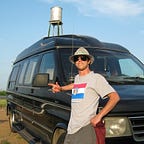Ciudad Juarez, Mexico
November 13th, 2018
There are approximately zero to one radio stations from Douglas, Arizona to Lordsburg, New Mexico. There is static at every point on the AM or FM dial except for 710 am, and that too is spotty. And changes. From 1960s Mexican Cha-Cha-Cha, to California wildfire updates out of LA, to Sunday Night Football, to Native American drumming from a res station, to tractor commercials from a station out of North Platte, Nebraska.
The euphoria of Bisbee, the grandeur of the desert at sunset, the romanticism of the lonely road ended with Randy, the cashier at the Love’s Travel Stop in Lordsburg. The conversation began with an inquiry about getting a beer and a burger locally and he turned it into a pleasant but pointed rant against Big Government. I asked him if he was a Trump supporter, but I coulda bet my last dollar on his answer. “Always have been, always will be,” he said nodding and smiling sweetly.
The venom came out when I asked about the border separations. “Cockroaches destroying our way of life…they’re throwing their babies across the border…they’re all coming to get on welfare,” Randy reeled off. I’ve heard it before, many, many times, but it’s gotten almost impossible to listen to since the talking points moved from right wing radio to the Oval Office. I tried to use my diplomacy, offering up first person accounts of asylum seekers whose families have been slaughtered by gangs in Honduras and Guatemala. “They just need to rise up like we did against the British,” Randy shot back.
“We don’t leave our gates and doors open at our house, why should we do it at our border?” he pushed on.
“Yeah, it’s a little more complicated when you’re dealing with countries of millions of people and thousands of miles of border,” I said, smiling. The household-to-global-policy metaphor is wildly common, up there with correlation equals causation as one of the biggest fallacies in American political logic.
I mentioned the economic studies that show immigrants are overwhelmingly a net positive to local communities. I knew there was little swaying Randy. But after the openness of Bisbee, I felt ambushed by the avalanche of resentment. I made my polite goodbyes and drove off cold and shaking, irrationally feeling like I might be followed. I’d gotten pulled over by Border Patrol last trip, and their SUVs followed me in and out of the truck stop. I had nothing to hide, but a mild Randy-induced panic. I was embarrassed that he shook me, angry that I didn’t do better, even though there wasn’t much I could have done different that would have mattered. I never asked til what point he will always back Trump. Maybe I was afraid to know.
The panic faded to gratitude that my new show is about folks who are complicated, who know the fallibility of their beliefs, who live on the borders of several cultures, who constantly burst their own bubbles.
The last person I talked to in Bisbee, AZ was a “local shmokel” (his words) named Roland. He grew up in Denver in the early ’70s. His father’s parents were native Yaqui Indians from the mountains of the Sonoran Desert who moved to Denver rather than become integrated into Mexican mainstream society after the Mexican Revolution in 1920. His Dad married a Swedish lady, and they volunteered to have Roland bussed to black schools when Denver did its first desegregation attempt in the early ‘70s.The other kids who volunteered to integrate were mostly liberal Jews, “And man, they got their ass kicked every day!” Roland didn’t get it so bad, ’cause he didn’t look white. He became a labor and political organizer in LA for thirty years before finally burning out and heading to Bisbee.
Then I drove for two plus hours in the desert, arrived in Lordsburg full of wonder and caffeine, and met Randy. It took me til morning to recover.
I felt myself again walking across the bridge into Mexico on a frigid morning, helping an old man, a laborer from the state of Durango, carry a heavy load of machinery and medicines. Conversation exhausted itself quickly as we had to focus on walking in step so we didn’t strain our necks. We trudged across the bridge in solidarity and injury-avoidance.
I went to Cuidad Juarez to meet up again with Deported Veterans Mike and Ivan. Mike and Ivan served in the U.S. military. But they’d signed up out of high school when they were living as permanent residents, back in the 1990s, when immigration was a soft wedge issue pushed by Ross Perot to limited electoral effect. They got charged for felonies as they sputtered in their post-military life, as some Vets do. But after serving their time, they got deported to Mexico, a country they’d left in infancy. Mike didn’t even speak Spanish.
I did a few bits of characters from the show for them, over beers and wings at Wing Daddy’s Juarez. “Yo, that’s really good,” said Mike. Then I did Mike for Mike. He threw back his head and laughed. Then he insisted I do it again, recorded a video of it on his phone, and sent it to his sister. Next day he emailed to ask if he could put it on Facebook. “Of course, man,” I said. He’s excited to send his ex-military buddies to the show when it opens in January. Can’t wait to have them see the show.
